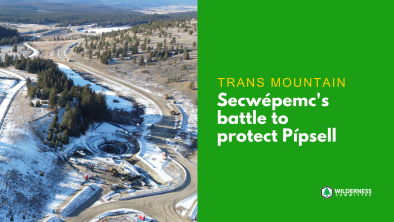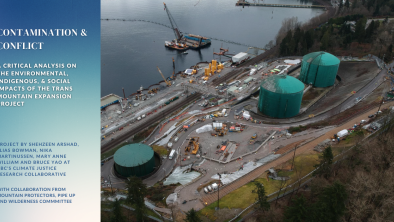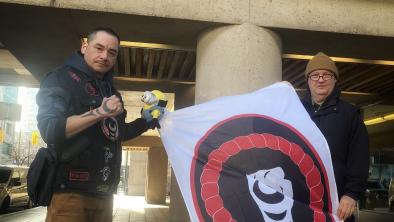Kinder Morgan submits pipeline proposal despite protests
The Martlet
National Energy Board Gives Condtions for Approval
Energy company Kinder Morgan submitted a proposal to the National Energy Board (NEB) on Dec. 16 for an expansion of its Trans Mountain Pipeline. The expansion of the pipeline, which they refer to as a twinning of the existing pipeline, would allow for the company to transport 890 000 barrels worth per day of a form of petroleum called bitumen—almost triple the previous capacity of 300 000 barrels per day. If the Trans Mountain Pipeline that runs from Alberta to the B.C. coast is approved for expansion, Kinder Morgan believes construction can begin early 2015 or 2016 and the line would be fully operational in 2017.
In a press release, Kinder Morgan Canada President Ian Anderson stated, “For the past 18 months we have engaged extensively with landowners, Aboriginal groups, communities and stakeholders along the entire proposed expansion route, and marine communities, and have carefully considered the input received during this period of study and dialogue.” Although Anderson suggests they are taking steps to gain feedback from a large group of those who will be affected by the pipeline expansion, there are still those who would rather not have it expanded at all.
The Wilderness Committee (a non-profit environmental organization) is one of the many groups that oppose the expansion of the Trans Mountain Pipeline. Torrance Coste, a Vancouver Island campaigner for the Wilderness Committee, voiced several concerns of the organization. Coste says the primary concern is the climate impact that the project will have. “Obviously a lot of prosperity in Western Canada has come from developing fossil-fuel resources, but just because that is the way we have gone in the past doesn’t mean it’s the only way that we could have gone and definitely doesn’t mean it’s the only way we can go in the future, or that we should go in the future,” he says.
Kinder Morgan’s press release says, “For 60 years, the 1 150-kilometre Trans Mountain pipeline system has been safely and efficiently providing the only West Coast pipeline access for Canadian oil products, including about 90 per cent of the gasoline supplied to the interior and south coast of British Columbia.”
Coste sees oil as just one product of the pipeline expansion. He says the emissions Kinder Morgan would put out in a year may be the equivalent of 15 years’ worth from every car on the road in B.C. However, the pipeline itself adds additional worries for the group. “The fact that it puts so many communities, so many ecosystems along its route—both the tanker route and the pipeline route—in jeopardy makes it unacceptable in its own right. Even if the end product wasn’t contributing to the destabilization of the climate, it would still be a backwards project because of the risk that it entails,” says Coste.
Coste also says that while there is a lot of investment, which creates jobs, during the construction phase, “the whole goal of that is to get it done as soon as possible. The sooner they’re finished that, the sooner they can start selling the oil. The whole goal of the construction phase is to get the workers out of work as soon as possible. When it’s finished, the staff on permanent jobs are [few]. In British Columbia, that’s really a drop in the bucket. Obviously they’d be well paying jobs, but if that’s really our goal, to create jobs, there’s better ways. There’s more efficient ways that are based on things that won’t run out like fossil fuels and tar sands and things that don’t forsake the climate.”
Kinder Morgan’s website differs from Coste’s opinion of the expansion’s effect on the economy, suggesting that Canada is currently losing out on $50-million per day in oil revenue. It says 45 000 jobs will be added at the peak of construction. Kinder Morgan’s focus is the trickle-down effect that the pipeline will have on the economy. According to Kinder Morgan, provinces and municipalities will benefit through the collection of taxes that Kinder Morgan will have to pay. They suggest that those taxes will allow for the employment of more firefighters, or the purchase of expensive medical equipment.
The Wilderness Committee has seen more non-traditional partners join them due to the possibility of the pipeline endangering their industries. Coste says people from fisheries, as well as tourism, have joined the group. In particular, a whale watching company co-sponsored a Wilderness Committee event in the summer.
No matter the amount of support for anti-pipeline groups, or the number of voices that oppose pipelines, the NEB can still approve the pipeline if it feels it is beneficial to the province. On Dec. 19, the NEB set out 209 conditions for the Northern Gateway Pipeline’s approval. Coste says the Wilderness Committee believes that the review process is flawed. He says 12 000 people gave oral presentations to the board, with only two supporting the Northern Gateway Pipeline, and people wrote several thousand letters, 95 per cent of which were in opposition; but the proposal was still approved.
Coste still hopes that the Trans Mountain Pipeline can be stopped. In reference to the importance of Kinder Morgan having access to the South West of B.C., he says, “B.C., and especially Vancouver, Victoria, and the Salish Sea, does represent a door that the fossil fuel industry needs in order to keep selling their products, and it represents one of the doors to climate change. But because there are so many people here in Vancouver and in Victoria and in the Salish Sea region, if we can organize together, and we can speak up and stand up together, it’s a door we can close.”
Photo: Kinder Morgan's Westridge Marine Terminal in Burnaby, BC (Joe Foy)


